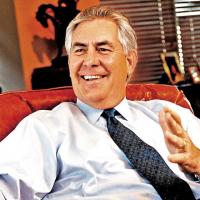On the same day Hilary Clinton released her plan to reduce the US addiction to foreign oil imports and significantly reduce greenhouse gas emissions, the CEO of the largest oil company in the world is balking at the pursuit for energy independence.
Rex Tillerson, chairman and chief executive of Exxon Mobil, has hit out at “isolationism” in energy policy (full article is firewalled) arguing that attempts to pursue energy independence are futile and counter-productive.
According to the US Department of Energy Information, ExxonMobil is the second largest exporter of crude oil to the United States originating from the Persian Gulf.
Tillerson stated that:
Regardless, no conceivable combination of demand moderation or domestic supply development can realistically close the gap and eliminate Americans’ need for imports.”Tilerson’s remarks, made at the World Energy Congress in Rome, provided support for calls from Opec, the oil producers’ cartel, for what the group calls “security of demand”.
Like what you read on DeSmogBlog? Subscribe to our RSS feed here.
Subscribe to our newsletter
Stay up to date with DeSmog news and alerts







